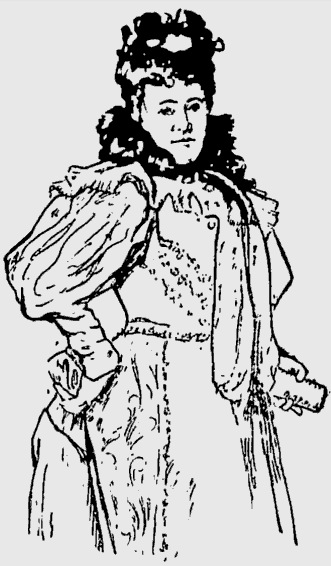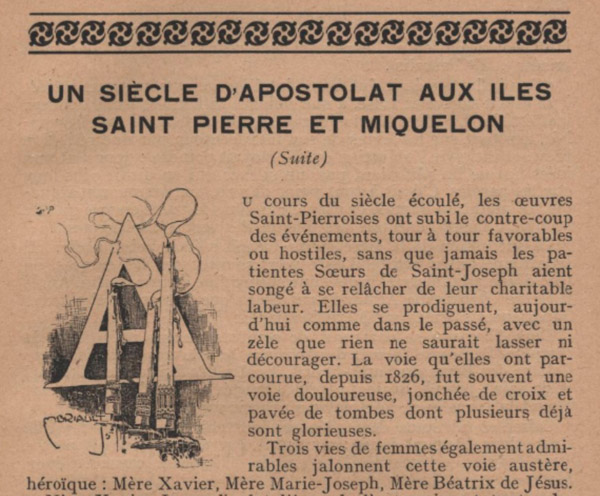La presse américaine a toujours été très friande d’histoires insolites, surtout quand ces dernières se consacrent à des personnages haut en couleurs. En 1899, un article consacré à une Saint-Pierraise fortunée fit le tour des Etats-Unis avec divers titres sensationnels :
- La Reine de Miquelon
- Madame Gavette, Reine de Miquelon
- La Reine de Miquelon n’aime pas les hommes
Publié à Boston, Paterson dans le New Jersey, Logansport dans l’Indiana et à Milwaukee, cet article brosse le portrait d’une certaine Marie-Louise Gavette, née Bernois, originaire de Tarbes qui serait devenue en quelques années la plus grande fortune des îles. Quant au titre de reine de Miquelon, il est très certainement le fruit de l’imagination des journalistes américains qui ne différencient guère nos deux îles.
Venue très jeune de Gascogne avec son père, elle fut éduquée dans un séminaire du Cap Breton (Nouvelle-Écosse). Mariée à 15 ans, elle fut veuve à 32 ans et l’héritière d’un petit hôtel des îles fréquenté par les marins des bancs. Madame Gavette aurait fait construire une cinquantaine de maisons pour héberger les marins et avait sous ses ordres une quasi-milice et plus de mille employés. L’article indique aussi que Mme Gavette était la propriétaire de goélettes et serait impliquée dans le trafic illicite d’alcool avec le Canada.
Cette riche veuve aurait été courtisée, sans succès, par de nombreux prétendants. Que sait-on d’autre sur cette Madame Gavette ? Rien du tout à vrai dire. Les annuaires administratifs de l’époque ne font aucune mention d’une Mme Gavette ni même de son feu mari. Il est vrai, qu’outre quelques listes de patentés, ces ouvrages s’intéressaient bien plus aux récipiendaires de médailles nationales et les nombreux administrateurs de la fonction publique locale.
C’est encore une fois, dans la presse américaine, qu’on retrouve de nouveau une brève allusion à Mme Gavette – si tel est son vrai nom. En effet, un certain Gerald Carlton, citoyen américain, voulait tant obtenir un poste consulaire, qu’il fut dépêché sur Saint-Pierre et Miquelon par l’administration du président McKinley. Arrivé à Saint-Pierre en 1901, Monsieur Carlton s’est vite rendu compte que ce poste ne lui convenait guère. Non seulement les activités du Consulat Américain de Saint-Pierre et Miquelon étaient plus que douteuses, Carlton découvrit que le poste n’offrait aucun salaire, que les coffres consulaires étaient vides et que de surcroît – la Reine de l’île, une riche veuve, avait tenté de le courtiser lors de son bref passage.
Carlton quitta rapidement les lieux pour l’Amérique et déclara à la presse américaine que ses « désirs consulaires étaient désormais guéris ». Notons en passant que selon un inspecteur nommé par Washington, que Carlton quitta l’archipel moins d’une semaine après son arrivée et aurait perçu un « paiement » de l’ordre de 200 $ versé par des agents consulaires Frecker et Steer.
Qu’est devenu cette reine des îles ? Qui hérita de sa fortune ? La réponse se trouve certainement dans les archives de Saint-Pierre et Miquelon. Il reste donc à découvrir son identité réelle, si tant est que le nom ne fut pas tout simplement inventé par la presse américaine.
Voici ci-dessous les articles concernés dans leur intégralité.
=======================================
Publications connues :
- SHE LIKES NOT MEN. Boston Daily Globe – Jan 8, 1899
- Queen of Miquelon, A remarkable woman who is a multi-millionaire, The Sunday Chronicle – Feb 26, 1899, Paterson, New Jersey,
- Madame Gavette, Queen Of Miquelon. The Milwaukee Journal – Mar 24, 1899,
- Logansport Journal – January 26, 1899, Logansport, Indiana
Miquelon’s Queen Has More Suitors Than Bess.’ She Runs a Big Hotel and Is, Moreover a Multi-Millionaire, They Say. She Entertains French and Americans and the English for Money.
She Runs a Big Hotel and Her Great Fortune is the Result of Her Own Efforts. Does not Like the Men – Has Many Suitors
The reason so few people have heard of Mme Gavette sometimes called the queen of Miquelon, is because they have not heard much about the island of that name lying with its sister, St. Pierre, off the western coast of Newfoundland. The Islands belong to France, and are so generally mentioned together that they are known as St Pierre-Miquelon.
There is not a blade of grass growing on the islands, which are two rocks, divided by a narrow strait, and yet they form a naval station, do a flourishing shipping business and have a trade estimated at 25,000,000 a year.
After the governor of the islands, who is a vice admiral, the most important personage in St Pierre-Miquelon, is Mme Marie Louise Gavette. She is a multi-millionaire, she has made all the money herself, and is a woman of literary talent with a streak of genius in it.
Mme Gavette, née Bernois, was born in Jarbes [Tarbes], Gascony, but was taken to Miquelon by her father, a sailor, when quite young, and sent for a few years to a seminary in Cape Breton N.S. She married at the age of 15 and when she was 32 was left a childless widow.
Some time before his death M Gavette retired from the sea and purchased a modest hotel which was patronized chiefly by sailors, of whom there are thousands in Miquelon, during the summer months.
It is hardly necessary to say that sailors – French sailors especially – are disposed to be lively and require a strong hand to keep them within limits. While her husband lived, Mme Gavette attended strictly to her domestic affairs, and was noted for her bright smile and sweetness of temper.
She possesses those attributes still, and widowhood has developed in her a strong hand. One day before she left off mourning a row occurred in the hotel barroom.
“Messieurs” said Mme Gavette, as she appeared on the scene of the disturbance with her brightest smile and a revolver in her right hand, ‘yonder esplanade is an excellent place to settle your little disputes. I’ll have none of them here. And I swear to you by St Agathe that I’ll shoot the first sailor attempting a fracas on these premises.”
Mme Gavette grew richer and richer year by year. She purchased a few acres of rock back of the Esplanade on which she erected 50 sailors boarding houses. Those boarding houses are kept in splendid condition and yield a handsome revenue to the queen of Miquelon.
She has organized a police force to guard her interests, which she pays liberally, and has altogether more than 1000 names on her pay roll, for she owns a fleet of brigs, schooners and other sailing craft trading with France, Newfoundland a Nova Scotia. She is phenomenally fortunate in her undertakings, all her employes are insured, and upward of 50 windows and superannuated seamen draw pensions from her treasury.
It is hinted that smuggling has materially assisted in building up the great fortune of this extraordinary woman, and certes Miquelon is a favorite resort of the class of gentry who fight shy of revenue officers.
It is known, too, that the French wines and brandies are as cheap as they are plentiful along the shores of Newfoundland. Nevertheless it must in justice be aid that among the many seizures effected by Queen Victoria’s revenue officers within the past quarter of a century, not a cent’s worth has been traced to the ownership of her majesty of Miquelon.
After he husbands death, Mme Gavette had as many suitors as the Grecian Penelope, but she dismisses them all with such chilling politeness that the number decreased to zero; her reputation as a man ruler and man hater spread far and near, and save a European nobleman, who now and then offers his name and dilapidated chateau of his ancestors, by mail, she is left in peace.
=======================================
Publications connues :
- CURED OF CONSUL FEVER. The Piqua Daily Call, 03 janvier 1902 Piqua, Ohio
- CURED OF CONSUL FEVER., Semi Weekly Iowa State Reporter, December 31, 1901, Waterloo, Iowa
- CURED OF CONSUL FEVER., Coshocton Daily Age, November 14, 1901, Coshocton, Ohio
Representative to Miquelon Had All He Wanted.
Gerald Carlton, who served as consul at St. Pierre. Miquelon, under appointment from President McKinley, was pointing out how undesirable such positions Are, says the New York Times. “It cost me $200 to get there,” said he. “and when I arrived, being one of them ‘literary fellers,’ I hadn’t any more money than I could conveniently carry around with me. There was no salary attached to the place, it being a fee office. I found that my predecessor had cleaned up everything in sight.
“To add to my troubles the ‘queen of the island.’ a wealthy widow, attempted to marry me and the Pooh Bah, a sort, of missing link, had a habit of being ever companionnable. I finally asked President Mc Kinley to stop considering me a consul. Then I packed my grip and started for the land of the free and the home of the brave. No more consulships in mind, thank you I’ve had that and been cured.”



J`aime bien cette histoire romancée qui cache peut-être une personne ayant réellement existée !
Quelques explications grâce aux excellentes recherches de M Rodrigue Girardin du services des Archives.
http://www.petit-colombier.com/viewtopic.php?f=22&t=666